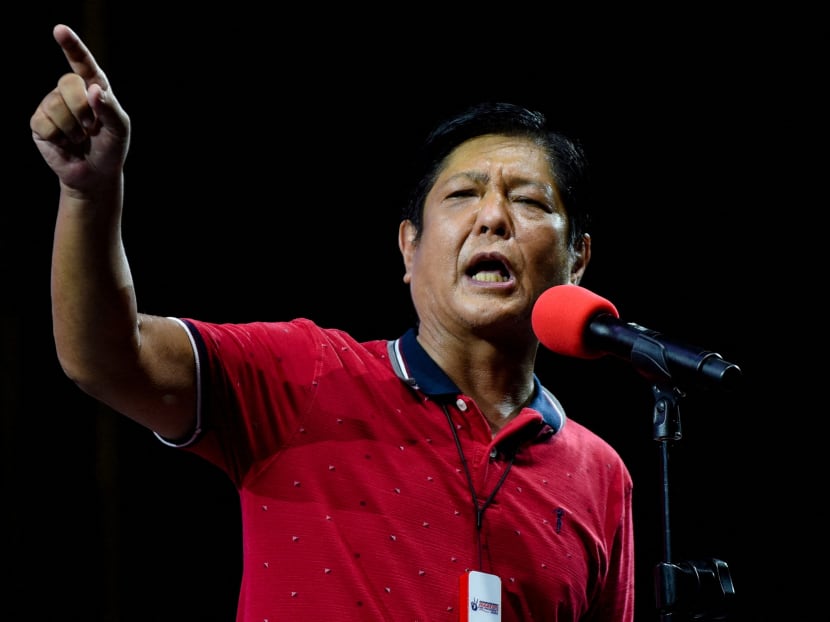Explainer: How did a dictator's son escape his father's shadow to be Philippine president? What does it mean for S'pore?
SINGAPORE — Some 36 years after brutal dictator Ferdinand Marcos was forced to flee the Philippines after a popular revolution, his namesake son has achieved the once highly improbable feat of returning the family to power with a landslide victory in the country's presidential election.

Mr Ferdinand Marcos Jr, son of late dictator Ferdinand Marcos, gesturing as he speaks during a campaign rally in Quezon City, Metro Manila, the Philippines in February 2022.
- Mr Ferdinand Marcos Jr, 64, has won 56 per cent of the vote in preliminary counting for the Philippines' presidential election
- This has made him one of the first candidates in recent history to win a presidential election majority there
- His father led the country for 20 years, including a brutal period after 1972, when he suspended parliament and arrested opposition politicians
- The father was later forced from power in a 1986 "people power" revolution
- Mr Bilahari Kausikan, former permanent secretary of Singapore's Ministry of Foreign Affairs, said he does not expect major foreign policy shifts with the new development
SINGAPORE — Some 36 years after brutal dictator Ferdinand Marcos was forced to flee the Philippines after a popular revolution, his namesake son has achieved the once highly improbable feat of returning the family to power with a landslide victory in the country's presidential election.
Mr Ferdinand Marcos Junior, 64, is on track to become the first candidate in recent history to win a majority. British news agency BBC reported that in preliminary counting, Mr Marcos — better known as "Bongbong" — had 56 per cent of the vote.
His opponent Leni Robredo, the incumbent vice-president, had just 28 per cent.
In Singapore, support for Mr Marcos Jr among the large population of Filipino expatriates and foreign workers appears to be even stronger, with preliminary figures showing support for Mr Marcos running at about three to one compared to Ms Robredo. The figures were 36,806 to Mr Marcos and 12,283 to Ms Robredo.
An official overall result is expected around the end of the month.
In a Facebook livestream on Monday (May 9) night, a social media platform at the core of his political strategy, Mr Marcos said: "There are thousands of you out there, volunteers, parallel groups, political leaders that have cast their lot with us because of their belief in our message of unity."
He made special mention of his mother, Imelda, calling on the crowd to greet her.
His mother, a former beauty queen, gained notoriety after her collection of more than 3,000 pairs of designer shoes were found in the presidential palace following a "people power" revolution in 1986.
Her collection of shoes came to symbolise the family's excessive wealth and corruption in a nation that was rife with poverty at the time.
She and her husband, who died in 1989, stole an estimated US$10 billion (about S$14 billion) from the Philippines' coffers, the BBC reported.
TODAY spoke to political scientists and observers to take a closer look at how Mr Marco Jr ascended to power, what this could mean for the Philippines' foreign policy and its place in the 10-member Association of Southeast Asian Nations (Asean), as well as the country's bilateral relations with Singapore.
WHO IS FERDINAND MARCOS JR AND WHAT IS HIS FAMILY HISTORY?
Mr Marcos is the only son of Ferdinand Marcos, who was the leader of the Philippines from 1965 to 1986. He was groomed for political power by his father from a young age.
"My father sort of wanted me to enter politics," he said in a 2017 interview with news agency Bloomberg. "He sort of forced me and pushed in that way."
His father's regime was defined by his declaration of martial law in 1972, which led to the suspension of parliament, the arrest of opposition politicians and censorship.
In the years that followed, an estimated 2,000 people were either killed or vanished while many more were tortured.
When asked about his father's regime, he replied television journalists in January: "We will no longer go back to 35-year-old issues."
Beyond these human rights violations and crimes, his family also siphoned money from state funds throughout his 20 years as president.
In the presidential election, Mr Marcos Jr's running mate for vice-president was Sara Duterte-Carpio, daughter of outgoing Philippine president Rodrigo Duterte, in an effort to capitalise on her father's continued popularity.
Many voters backed Mr Marcos Jr in hopes of a continuation of Mr Duterte's policies, including his controversial "war on drugs", which has become the subject of investigation for possible crimes against humanity by the International Criminal Court (ICC) in September last year, but has since been put on hold.
HOW DID MARCOS WIN?
A report by The Washington Post in the United States, based on a survey of 2,400 Filipinos, found that younger voters seemed keener to elect him as president because they did not have direct experience with the violence, corruption and instability of his father's regime.
The country's education system also did not educate younger voters on martial law and Marcos Sr's regime.
German think-tank Heinrich Boll Stiftung said in a report that Mr Marcos Jr appealed to these younger voters using the country's dominant influencer culture, which "celebrates a confident outlook while denying the brutal realities of the past".
Associate Professor Terence Lee, from the department of political science at the National University of Singapore (NUS), said that Mr Marcos Jr's use of social media "was able to mount quite a successful campaign of disinformation".
He told TODAY in a phone interview on Tuesday: "There was serious revisionism... In his campaigns, there was no policy platform and he avoided presidential debates, yet he was still able to win."
“In his campaigns, there was no policy platform and he (Mr Marcos Jr) avoided presidential debates, yet he was still able to win.Associate Professor Terence Lee, from the National University of Singapore's department of political science”
Mr Dedi Dinarto, associate at Global Counsel, a public policy advisory firm, said that Mr Marcos Jr's victory is rooted in two factors: A massive disinformation campaign and the popularity of his running mate Sara Duterte-Carpio.
He said: "Despite growing concern over possible corruption and nepotism when he rules the country, Marcos Jr will likely appoint competent technocrats for economic policymaking — a precedent that his predecessor Rodrigo Duterte did."
Assoc Prof Lee said that the results highlight the salience of political dynasties in the Philippines.
"They have important reach in not just politics but economics as well, so if you look at the House of Representatives, the Senate, you will see that many of them are clustered around famous families... So this is just a reinforcement of the politics that the Philippines has seen throughout its modern history."
However, it is unlikely that his administration will be a repeat of his father's regime, the analysts who spoke to TODAY said.
Assoc Prof Lee said that financial mismanagement during Marcos Sr's regime happened because of a congruence of factors, with foreign patrons such as the United States and the family's centralisation of power.
"Marcos Sr was able to use the emergency powers according to him when he declared martial law in 1971... Now, there is no such analogous context again, because unless Bongbong can find a situation to declare martial law all over again, this is not possible," he said.
WHAT DOES MARCOS' ELECTION MEAN FOR THE COUNTRY'S FOREIGN POLICY?
Foreign policy has never been an electoral issue for the majority of voters in the Philippines, analysts said.
However, Mr Marcos Jr's foreign policy towards China and Asean is being watched closely by observers, as China continues to ramp up activities in areas that the Philippines deems to be part of its maritime territory.
The academics and observers who spoke to TODAY said that there should not be major shifts in the country's policy towards Asean.
Former Ministry of Foreign Affairs (MFA) permanent secretary Bilahari Kausikan said: "In broad terms, I do not expect any significant change in either bilateral relations (with Singapore), which are and will remain good, or in Philippines approach to Asean."
“In broad terms, I do not expect any significant change in either bilateral relations (with Singapore), which are and will remain good, or in Philippines approach to Asean.Former Ministry of Foreign Affairs permanent secretary Bilahari Kausikan”
Dr Alan Chong, Associate Professor at the S Rajaratnam School of International Studies (RSIS), said: "I don't foresee any change in its foreign policy (from the Duterte administration) because Asean is useful for the Philippines.
"When China pushes them in territorial disputes, Asean is the forum that they can go to, like most of the Asean states do."
Dr Chong also said that it is likely Mr Marcos Jr will continue with his predecessor's "pragmatic" approach to Asean relations.
On relations with major powers, Mr Dinarto from Global Counsel believes that Mr Marcos Jr's foreign policy stance is likely to be similar to that of his predecessor as well.
"More strategic economic partnership with China is expected under Marcos Jr, while he will maintain a lukewarm approach with the US as a viable option. The latter, however, might not be smooth-sailing because of the pending contempt judgement by a US court due to his father’s past human rights abuses."
Mr Dinarto added that the "limited option" could result in the dilemma of working together with China while dealing with China's assertiveness in its South China Sea claims.
However, other observers said that it might be too early to tell because there have not been clear signals.
Assoc Prof Lee said: "His campaign had no policy platforms at all. It was a personality-driven campaign... There is no indication of what his foreign policy stance is."
WILL SINGAPORE'S BILATERAL TIES WITH THE PHILIPPINES BE AFFECTED?
Similarly, the analysts think that it is unlikely for Mr Marcos Jr to rock the boat in the country's relationship with Singapore.
Dr Chong from RSIS said: "I think that when it comes to Southeast Asia and relations with their neighbours, the Philippines will be very pragmatic. Much like in Duterte's presidential campaign, he badmouthed some Asean states but this all changed when he was in office.
"Do not underestimate the pragmatism of authoritarian leaders in the Philippines."
However, he warned that a repeat of the incident in 1995, when Singapore executed a Filipino domestic worker Flor Contemplacion after she was convicted of murdering a colleague and four-year-old boy in Singapore, could cause tensions to rise. The incident strained ties between the two countries.
"One hope is that there will not be a repeat of such an incident. The politics of the poor is a lightning rod," Dr Chong added.










